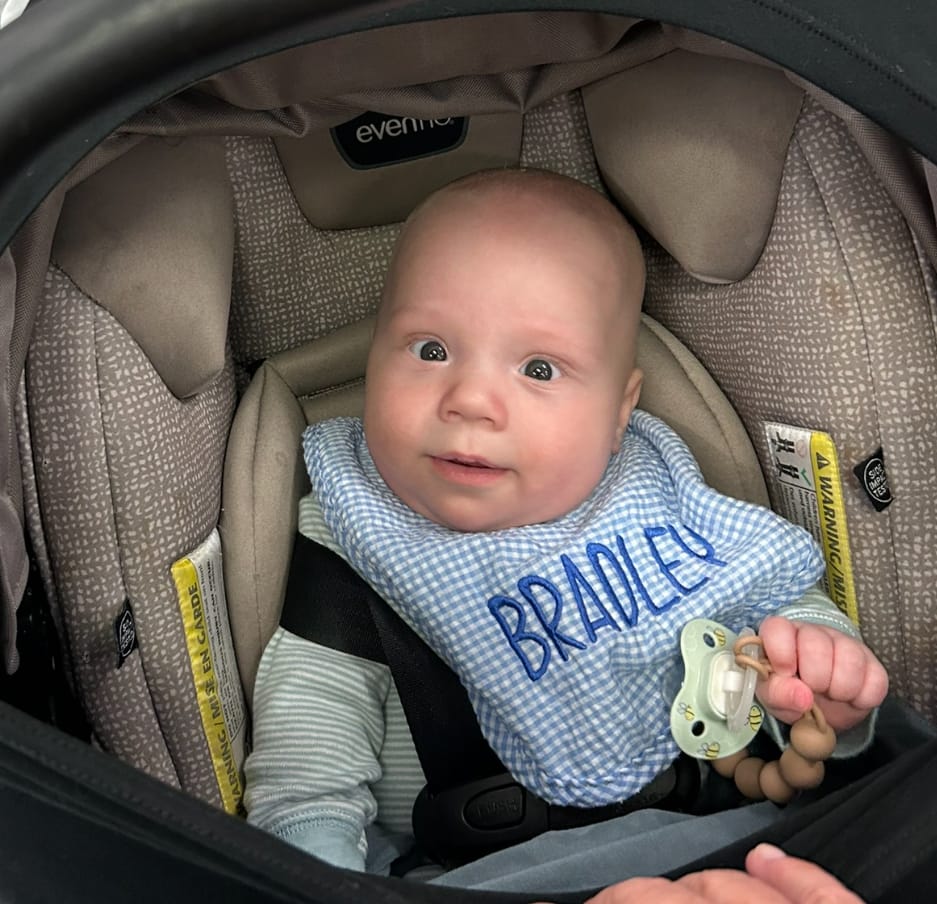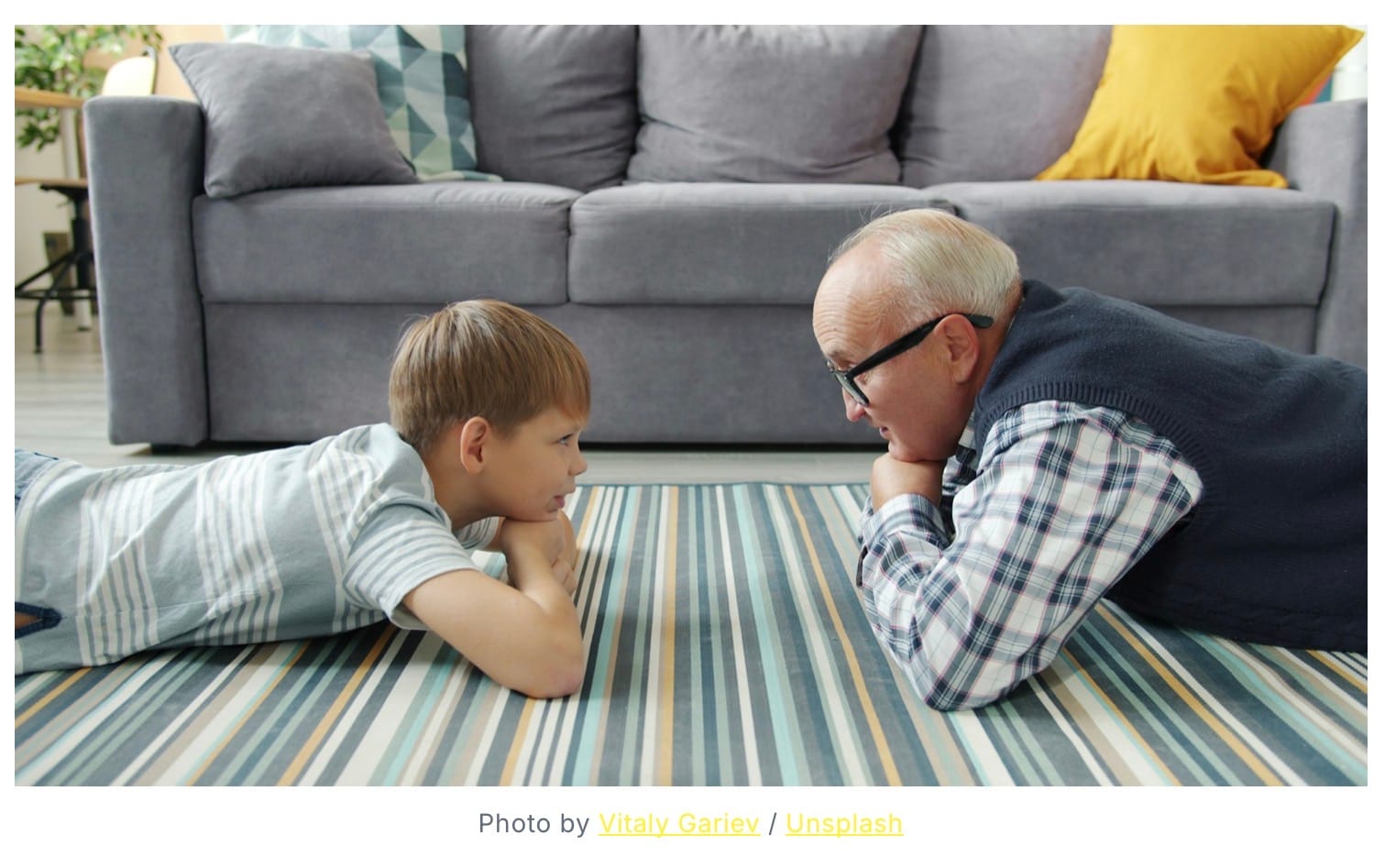This week’s Teaching Tuesday is a “TWO-FER”. Sometimes, there are two topics just screaming to be discussed. Over the last week I heard two interviews that sparked my interest. The first one was with Kevin O’Leary of Shark Tank-Mr. Wonderful and absolutely no relation to our grandson, who I often refer to as “Little Mr. Wonderful” because I think he looks a little like Kevin, or at least he did as a baby. Kevin was asked in an interview, what was the best financial advice he has given his children. His answer was that he taught his kids to resist the temptation, as much as possible to buy stuff they don’t need and to save their money.


“Little Mr. Wonderful” AKA Bradley Brooks and the man himself, Kevin O’Leary from Shark Tank is a Canadian investor, entrepreneur & television personality.
So simple of an idea and over time, what a difference such actions could result in. Instilling this habit into your children early, might be easier than you think. It starts with teaching your kids early on not to think they need so much. Do you really need to reward them with a toy for every good choice? Do you really need to take that trip to Target or the Dollar store for more ‘stuff’ that will end up in the garbage or as an unused toy in a few days? When you kids start asking for stuff they don’t need, ask them, “Do you really need that?” Focus on experiences as rewards. This may involve more creativity on your part, yet once you start thinking like this, the easier it gets. Set the example on YOUR part. Do you really need to stop at Starbucks as part of YOUR routine? $5 or $6 day after day adds up to lots of money spent when you most likely have coffee at home and it would cost you cents rather than dollars. Eat in frequently, resisting the temptation for a stop thru the fast food drive thru. As your kids get older, have them come up with creative lunch or on the go ideas. In my book, I have a recipe for Chicken McMammas, my version of the McDonald’s chicken Mac Nuggets, and they are healthier anyway. With Pinterest, Instagram and the ability to look up recipes, you can get your kids on this. Our daughter, son-in-law and their two girls spend time on Sunday meal prepping for the week, the girls take part in this and the clean up. When kids are involved in the kitchen, they become more involved and engaged in their food and what they are eating. This is a fantastic opportunity, when you all are in the kitchen to talk about nutrition and making good food choices. Your kids start having opinions about different foods. My rule with our kids and grandkids is, “You must try it. It’s fair not to like something but you must give it a try.” This expands their horizons on different flavors, tastes and foods many times, they end up liking something they thought they would never like. Yes, there are times for a quick trip through the drive thru, but make this NOT the norm, and when you do, make good choices.

This same idea can be instituted at holidays. Do your kids really need a room full of toys on Christmas morning or during Chanukah? If kids have too many toys, they don’t appreciate what they have, not to mention how overwhelming it is to them. Weed out and sell or donate what they don’t need. A few toys for the special box to pass on to their kids yes, but to keep stuff you don’t need when you could sell it or pass it on to someone who needs it, is a much better use of your resources. Ditto with clothes. When your kids are old enough, talk to them about the value of money. Let them see how much you make in a garage sale or how much you make when you sell items on Poshmark. They understand more than you think. Keep track of how much your save at the grocery store. When our kids were at home, I would tell them how much I saved-at Kroger they print it on the bottom of the receipt. Have your kids help with the coupons-remember it’s not a deal if you don’t need it! Make this part of your daily discussions and it will become part of how THEY think. Good Lesson Mr. Wonderful…

Second interview that I thought was very valuable this week was an interview Megyn Kelly had with Jordan Peterson. Megyn is an attorney, former host of her own show on NBC following her tenure on FOX NEWS where she had her own evening show. Jordan is a very popular Canadian psychologist, podcaster and author. Jordan often discusses popular social issues. He is also the CEO of PETERSON Academy, a higher education platform at 1% of the cost of the current university. Jordan refers to himself as classical liberalist or traditionalist. Many refer to his views as conservative. In the interview, the topic is that there is not a roadmap for young women (in my opinion for young men either) as to how to pursue a career, family and raising children. Peterson suggests that realisticly, women are most likely to have the best time conceiving without having to enlist fertility treatments and with less complications is in their twenties. Research has proven that for a mother to take time out from a career if possible in the very early years (birth to age five or even to age five) and picking back up the career when the kiddos go to school, is very beneficial for a child’s emotional wellbeing. This isn’t always possible and when it isn’t, enlisting caring and very qualified people to help is crucial. Outside of work, parents who focus their time around spending time as a family will yield the best outcome for both children and parents. Megyn Kelly echoed her thoughts on this topic. From her perspective, as a woman who didn’t find lasting love until her mid-thirties, when she met her second husband, Doug Blunt, and then after they married went on to have three children into her early forties, she said that looking at the experience later down the road, it makes her sad to think that had she had met the right person in her twenties and had her children in her twenties, she would have all that more time with them when they had their children. True and good point as well. Megyn and many other women enjoy the challenges and fulfillment of work and do a fine job of balancing their responsibilities. In those years, the “Pick Three Method” helps- the idea that you can only focus on three areas of concern, Children/Family, Work and Maintenance/Health of the Family (an idea Mark Zuckerberg’s sister wrote about in her book, Pick Three- I came across this book a couple of years ago and it covers this concept quite well. Peterson states that there is so much emphasis on women working to pursue a career more than family and motherhood. I agree and sometimes that part of a young person’s life is an after thought, thinking, “Oh, I’ll meet the right person, AFTER I get established” or putting off marriage or having kids until “AFTER we have money in the bank” or “AFTER we have the big house and money for private school”. Peterson states that statistically many young adults really are putting off marriage, having kids or throwing in the towel on it all, opting to stay single and not having a family. Statistics also show that being married and having a family brings so much joy to a person’s life. The numbers show that people who are married, live longer and if they are married to the right person, they seem to be happier. Of course they are some people who are perfectly happy being single or not having children. I respect those people who have made these choices they know what they want and to be made to feel that they have to make these choices to be like everyone else, is not right. Everyone is an individual. Better to be single than to marry the wrong person or to have a child when a person derives happiness from a fulfilling career and being the aunt or uncle.

So how does one instill or teach their child to strongly consider the benefits or options to find the right spouse and significance of having children? Talk about it. When your children start thinking about dating you can explain that dating allows them to meet people who could be a potential husband or wife. You get to see what another person is like and evaluate what kind of a person you might to end up with. It allow your teenager or young adult a chance to learn how to be as a potential spouse. If your child is self centered, they will see how that works in a relationship. If they are a giving person, they will learn to see that they may want to end up with a person who is also a giver rather than a taker. Stress the importance of marriage being a TEAM THING, two people working together for the good of the family. During the pre-teen and teen years talk about these issues. Meeting and ending up with a person who values the same things they do is paramount. For example, if a person has a strong faith, they may be most happy with a spouse who also values their faith. It might become a problem if they go to Church or Temple and their spouse takes that time to workout or go fishing. When kids are younger, it’s more subtle. You may start imparting lessons like “Your Dad really helps me out, I appreciate him helping with the food prepping on Sunday afternoon. Mom and Dad both work and when Dad helps, it means that we get done sooner and we have more time to have fun Sunday afternoon.” Or, “Your Mom really helps out when she clips coupons and saves money. It means that we have more extra money and that we work as a team for the good of our family.” Kids just don’t turn up to age twenty-eight and the person they are to marry magically appears and they have that first baby baby by age thirty.

Consider the numbers of it all. It takes time to date and find the right person. Most often people date for about a year, once they meet the right person on average before they marry, they are engaged for nine months to a year, they may want to have some time after marriage and before they have children. Talking to not only daughters but sons as well as to the road map of meeting the right person and then starting a family. The more you discuss this topic, the more your kids will feel comfortable coming to you. You WANT them to come to you. You love them more than anyone else and you will give them accurate information based on your wisdom and life experience. Who you end up with is one of the most important life decisions a person will make. This decision and these life choices shouldn’t be left for ‘down the road.’
Two good topics this week that sort of go together; being a good steward of the money may mean that you have more choices down the road if your child decides to have kids. Money saved early on, on things your kids don’t need, will bode well for them in the future. Both lessons and topics addressed early on can lead to, down the road…Many Great Days 🍎







